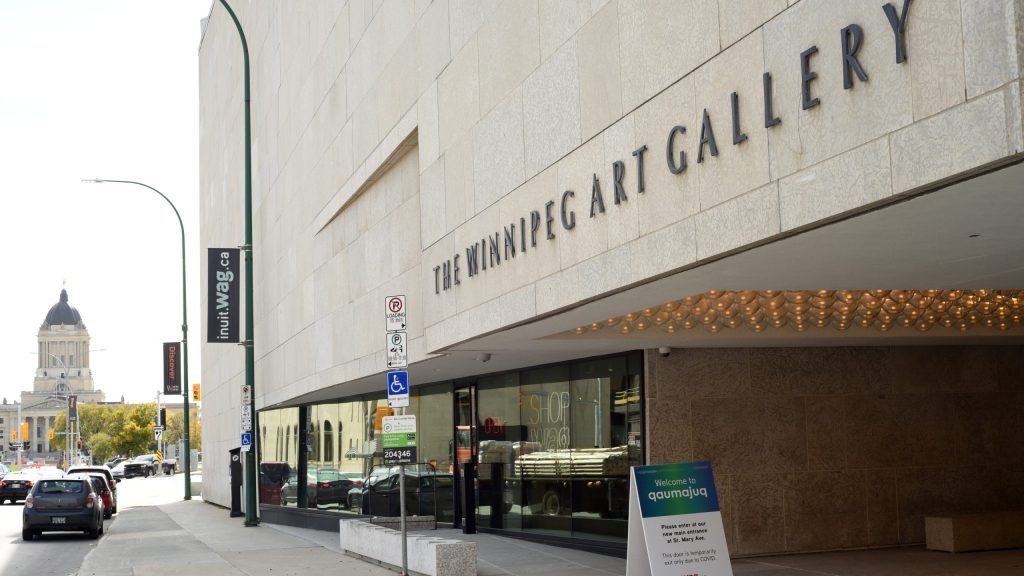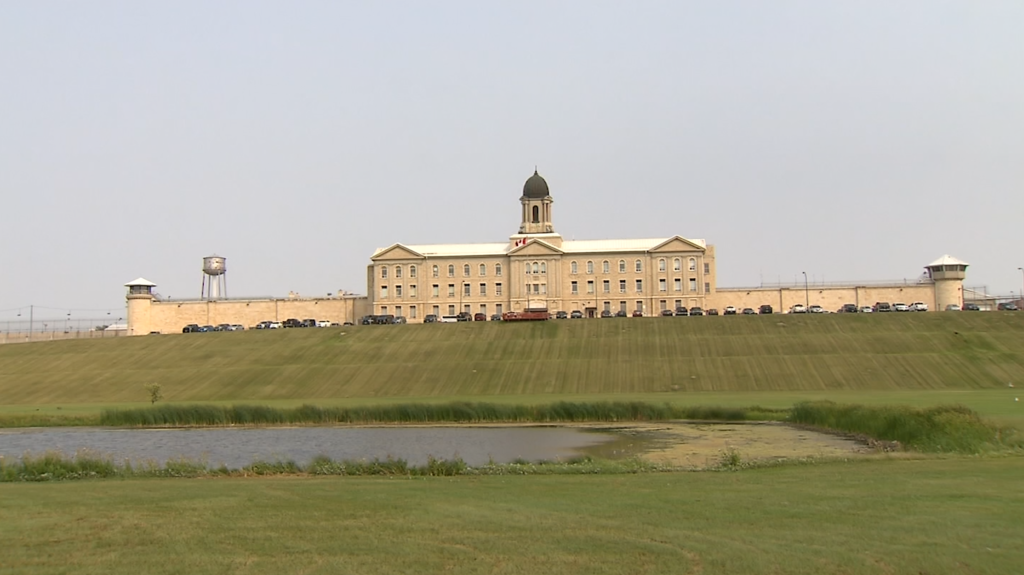Nazi claims against former Winnipeg Art Gallery director lead to calls for recognizing Canada’s past
Posted November 28, 2023 5:31 pm.
Last Updated November 29, 2023 9:06 am.
An anti-fascist scholar says Canadian institutions must reconcile their possible Nazi pasts after revelations about a former Winnipeg Art Gallery director.
New evidence published earlier this month about Ferdinand Eckhardt, who was at the helm of the WAG for 21 years, suggests he was a strong Nazi supporter.
Helmut-Harry Loewen, a scholar and former sociology instructor at the University of Winnipeg, says he was “blown away” by Conrad Sweatman’s Nov. 9 article in the Walrus.
“It became clear then that some of my initial suspicions were on the mark,” said Loewen, who called Eckhardt a respected leader in the Canadian arts community.

Loewen says evidence presented in the article proves Eckhardt was a Nazi supporter, such as his writings being published in well-known Nazi newspapers.
But the irrefutable evidence, according to Loewen, is the public vow of allegiance to Adolf Hitler signed by Eckhardt and 87 prolific German writers. Eckhardt’s name is next to writer Gottfried Benn, who Loewen says was a well-known Nazi sympathizer.
“This was a very interesting document to me,” said Loewen. “Not just anybody was able to sign that document, you had to have some standing.
“These are all indicators, and this is the crux of the matter. You can call Ferdinand Eckhardt a ‘fellow traveller’ or a ‘sympathizer’ with Hitler. There’s no question he was that. It goes deeper. He was an ideologically committed fascist who was a faithful servant to the genocidally racist Nazi regime.”

Sweatman found the record, which Loewen calls an important document in the Nazi regime, in the Manitoba Archives.
“It’s always surprising to find Nazis in your home turf,” Sweatman said. “After you get over the initial shock, I am trying to understand Eckhardt on some level.
“While it’s possible people may talk about context, they may get into nuanced questions at the edges of things, Eckhardt’s foray into Nazi politics is a fact.
“Anyone questioning, get thee to the archives.”
The idea for Sweatman’s “Was the Winnipeg Art Gallery Led by a Nazi?” was born after speaking with an acquaintance whose mother was Eckhardt’s secretary. She always had suspicions about the man’s Nazi sympathies.
That led Sweatman to finding a profile of Eckhardt published in a German art history book that detailed Eckhardt’s Nazi articles published in 1933-1934.
After those initial discoveries, he continued to research libraries and archives in Canada, Germany and Austria and found numerous documents aligning with the claim Eckhardt upheld Nazi ideology.
“With the rise of the radical right in North America, it’s a subject of interest for many, including myself,” Sweatman said. “Of course, there’s been a lot of conversation about Nazi expats in Canada.
“There’s no denying that I was hard on Eckhardt in my article. I’m also prepared to say a lot of ordinary people under those circumstances were seduced by Nazi ideology and Eckhardt may have only been seduced by it for a few years, although there is a concerning pattern of things that happened after that period, too.”
Meeting Eckhardt: ‘I was guarded and cautious’
Loewen – whose own research focuses on the history of Nazi Germany, Nazi war criminals in Canada and current-day Neo-Nazis – considers Sweatman’s research to be sound because it’s mostly archival documents and German scholar research.
The activist and former sociology instructor specialized in fascism during his time at the University of Winnipeg. His career path was inspired by early examinations into the philosophers and writers who had to go into exile from Nazi Germany.
But the link between Loewen and Eckhardt goes beyond research topics.
Loewen was born in Winnipeg in 1954 in the same German-speaking Mennonite community that Eckhardt found a “second home” in when he immigrated to Winnipeg in 1953.
After studying at the University of Mannheim in Germany, Loewen was hired as a contract instructor at the U of W in 1984. That’s when he first learned of and met Eckhardt.
“I was asked by the then-German department chair to accompany him to a meeting with Dr. Eckhardt, who I didn’t know much about because I’d been in Europe beforehand,” Loewen recalled. “I was told who he was, this and that, and that Eckhardt was looking at ways in which the University of Winnipeg could honour the legacy of his wife, composer Sophie Eckhardt-Grammaté. I went a bit reluctantly, but I went as a favour to my chair at the time.”

That reluctance came from a suspicion, Loewen tells CityNews, about Eckhardt’s career during WWII.
“I was guarded and cautious,” Loewen recounted. “He was also fairly guarded and cautious towards me because he knew, and I was just a young 30-year-old budding instructor, but I’d come recently from Germany and he knew exactly. Maybe I had told him or my chair had told him what I had been studying in Germany, which was this tradition of philosophy and German literature by artists who had to flee Nazi Germany. So that would have been a very uncomfortable topic with him, which we didn’t pursue.
“But he would have been able to peg me precisely that I was on the left somewhere, probably on the far left, and he was absolutely correct about that. And secondly I was able to peg where he was without knowing much about him. So I was guarded and I didn’t want much to do with him, but it was cordial. I was there in a semi-official capacity but I had almost no input. I then told my chair, I don’t want to attend any more meetings. I’m not needed. He can pursue this with other professors, which he certainly did.”
The now 69-year-old Loewen says Eckhardt proceeded to “camouflage” the more “unsavoury parts” of his background, remaking himself into an icon the Winnipeg’s cultural community. Eckhardt became a key figure in helping to build the Winnipeg Art Gallery into the institution it is today, according to Loewen.
WAG-Qaumajuq investigating claims
The Winnipeg Art Gallery, now known as WAG-Qaumajuq, says it is taking the claims about Eckhardt’s past very seriously and is investigating the matter – with the help of research provided by Sweatman. The findings will be shared publicly, the gallery says.
“Our commitment to historical integrity and transparency means that any allegation, proven or not, must be researched and the findings shared with our public, adding to the great depth of research the Gallery already has,” a WAG spokesperson told CityNews in a statement.
“We will use the same deep reflection we have used to decolonize the WAG to understand this recent revelation about Ferdinand Eckhardt personally, professionally and in the donations he has made.”
The art gallery says Eckhardt was hired by a “a reputable selection committee who did extensive vetting” on his past. The spokesperson adds he was a “friend and champion of artists who were banned and persecuted by the Nazis.”

Pockets of Nazi support in Canada in the 1930s
Loewen says the claims about Eckhardt’s past are hardly isolated in Canada. He claims there were pockets of support for Nazi Germany and Benito Mussolini’s National Fascist Party in Canada.
In Winnipeg specifically, there was public support for Hitler and the Nazi regime as early as 1933, according to Loewen, with Hitler’s foreign ambassadors organizing shows of public support. The scholar says there were public meetings in praise of the Nazi leader in German-speaking Mennonite communities.
“You can’t make a generalization about Mennonites but already in the 1930s, from 33-39 for example, there was substantial support for the Nazis in Winnipeg and southern Manitoba (in) German-speaking Mennonite communities,” said Loewen.
“We have photographs of large choirs, German-Mennonite choirs singing praises to Adolf Hitler under the swastika here in Winnipeg.”
At that time, many pro-fascist groups – with support from different immigrant communities in Winnipeg – came to light, Loewen says. There were uniformed marches and anti-Semitic material delivered at Portage Avenue and Main Street and Market Square in 1933-34. Loewen says it culminated in anti-fascist groups clashing in the Battle at Old Market Square on June 5, 1934.
Loewen says by 1939-40, public support “quieted down” as Canada was entering the war against the Nazis.
Anti-Semitic and pro-Nazi legacies
Sweatman says his intent in bringing more information to light about the former art gallery director was to start a conversation – both about Eckhardt and Nazism in Canada.
“Why is it there were so many Nazi expats in Canada and what was our relationship with them? What does this say about post-war Canadian liberalism and things like that. So it does raise broader questions I think about the history of Winnipeg and the history of Canada,” Sweatman told CityNews.
“I know he’s a complex person and I’m hoping that, if people are interested, maybe a more nuanced conversation happens about who he was.”

Loewen says Canada is still dealing with anti-Semitic and pro-Nazi legacies – pointing to a recent incident where a man who volunteered to fight in a Nazi unit was honoured by Parliament – with claims about Eckhardt’s past representing just one element of that.
“These legacies have an afterlife. If we don’t learn from the past, as many historians have said, we will make very similar mistakes going forward. We need to learn from people like Eckhardt,” said Loewen. “We need to learn why these attitudes of anti-Semitism and pro-Hitlerism were so widespread.”
He feels it’s up to universities, scholars, art administrators, donors and patrons to acknowledge difficult pasts and find ways to move forward.
“The question we are confronted with now is, given this research, what do we with the information that we have about Eckhardt’s deep-seeded commitments to fascism and his loyalty to Hitler, and the fact that he actively worked on behalf of the Nazi regime?
“What are we going to do with that information? The ball is in their court.”
CityNews reached out to two institutions of higher learning in Manitoba with links to Eckhardt.
A lecture hall and a library collection at the University of Winnipeg are named after Eckhardt’s wife, the composer and musician Eckhardt-Grammaté.
“We take the content of the article very seriously and are committed to thoroughly examining the matter and acting according to our institutional values of human dignity, equality, respect, and diversity,” a University of Winnipeg spokesperson said.
And Eckhardt received an honorary doctorate from Brandon University in 1990. A spokesperson there said the allegations started “some conversations” at the university.








